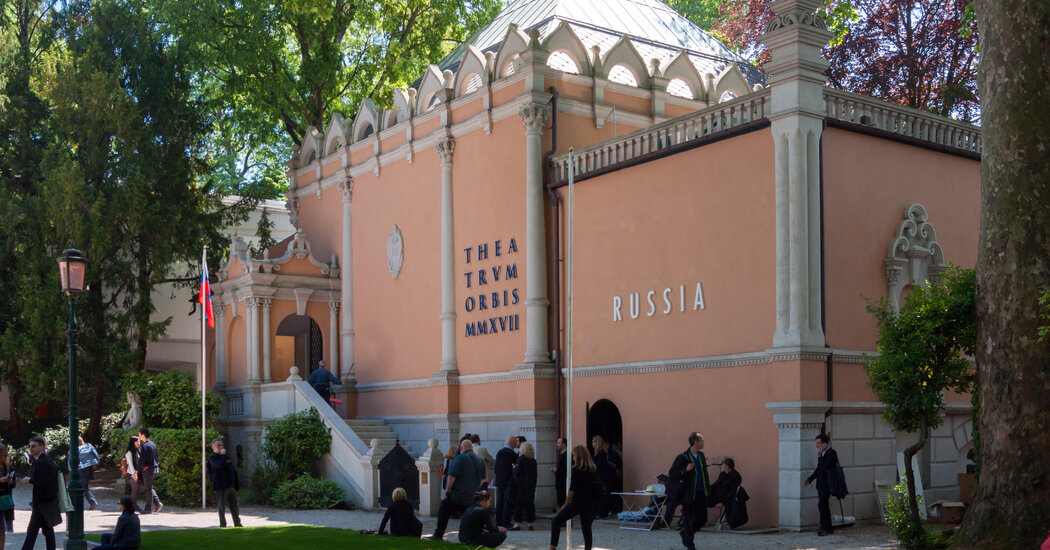
The young Russian artists Kirill Savchenkov and Alexandra Sukhareva were set to represent Russia in April at the Venice Biennale, the art-world jamboree that can turn little-known artists into global stars.
Now, that potentially glittering future seems to have vanished.
On Sunday, the pair withdrew from the event, posting a short statement on Instagram and Facebook. “There is no place for art when civilians are dying under the fire of missiles, when citizens of Ukraine are hiding in shelters, when Russian protesters are getting silenced,” the statement said.
Raimundas Malasauskas, the curator of the Russian Pavilion where Savchenkov and Sukhareva would have presented their work, joined them in pulling out. The pavilion will now “remain closed” throughout the Biennale, according to a statement its organizers posted on Instagram.
Many Russian artists oppose the war, but few have such high-profile platforms for protest as Savchenkov and Sukhareva. Thousands of street demonstrators have been arrested in Russia since its army invaded Ukraine on Thursday, and speaking out could damage career prospects, and even lead to arrest, or jail.
Yet thousands of artist and cultural administrators have signed their names to online petitions to express industrywide opposition to the war. One, calling for an immediate end to the conflict, had over 17,000 signatures on Monday.
That petition describes the conflict as “a terrible tragedy” that puts cultural life in Russia at risk, since international partnerships may be stopped, and institutions forced to shut as sanctions bite and the Russian economy falters. “It will be almost impossible to engage in culture and art in such conditions,” the petition says.
Their opposition has been noted in the Kremlin. On Sunday, Vyacheslav Volodin, a senior lawmaker, took direct aim at cultural figures opposing the war, calling their actions a “betrayal.” “If you are so principled, start by refusing state grants,” he added in a statement posted to Telegram, the social media app that is popular in Russia.
Two Moscow contemporary art museums paused their programming in response to the war’s outbreak, although both stopped short of criticizing the government directly.
On Saturday, the Garage Museum of Contemporary Art announced it would “stop work” on all future exhibitions “until the human and political tragedy that is unfolding in Ukraine has ceased.” Forthcoming shows include exhibitions by the German art-world star Anne Imhof and Helen Marten, a winner of Britain’s Turner Prize. The Garage did not reply to a request for comment on Monday.
The Garage was opened in 2008 by Dasha Zhukova, a prominent art collector, with the backing of her husband at the time, the oligarch Roman Abramovich, who is widely seen as an ally of President Vladimir V. Putin of Russia.
GES-2, a Moscow museum that opened last year, issued a similar statement on Sunday, saying it “cannot turn a blind eye to the tragic events we have all become witnesses to” and that it would shut all exhibitions and suspend events.
The museum is financed by Leonid Mikhelson, chief executive of Novatek, Russia’s largest private gas group, who has close ties to the Kremlin. In December, Mr. Mikhelson gave Mr. Putin a private tour of the new museum. A GES-2 spokesman declined to comment.
Mr. Kjartansson said in a telephone interview that he made the decision to withdraw the piece as soon as he woke up on Thursday and heard about the invasion. He wouldn’t consider reopening the show until “Putin was overthrown and we had a bright, beautiful Russia,” he added.
Since the war began, Mr. Kjartansson had spoken with dozens of people in Russia’s art world and all were horrified by what was happening in Ukraine, he said, but few felt they could say anything publicly. Even signing an online petition was “very, very brave,” Mr. Kjartansson added.
Russian artists cannot be as open in their criticism of the war as Mr. Kjartansson. On Monday, one of the artists behind a popular antiwar petition said in a telephone interview that she couldn’t reveal her name for fear of retaliation. Some of the petition’s signatories had already lost their jobs, she added.
“From my point of view, we have no future, so we have nothing to lose in speaking out against this,” she said, “But at the same time we are all afraid.”



